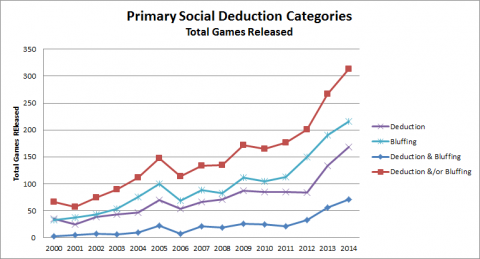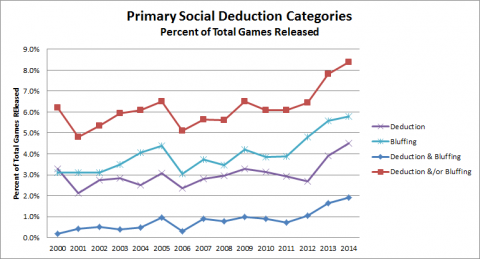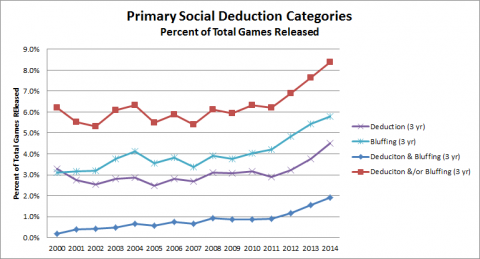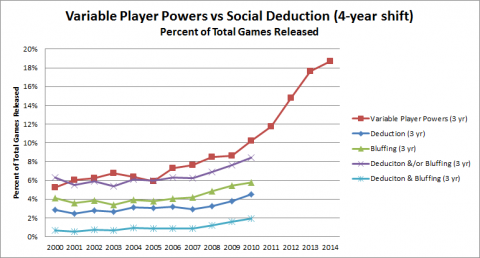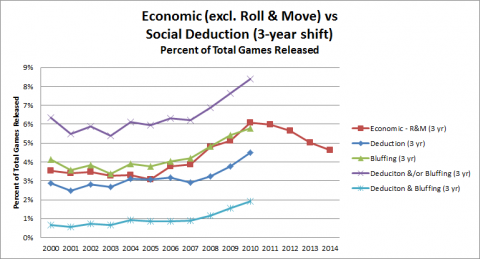Hobby Game Trends 2000-2014 Round 7: Social Deduction Games
Categories Focus: Social Deduction Games
When I started this research, I was really only interested in “Social Deduction” games, but here it is, round 6 and I am only now getting to the work I set out to do. So much of this hobby turns out that way. Fans and critics alike might say, in different tone, “It seems like every new game is a social deduction game!” As a fan of social deduction games and working on a few designs myself, I am very interested in the current trend in releases of games that fit this category. Is it overrun? Is there room for just a few more great games? (Mine of course will be great).
At a Glance
As with Economic games, defining the category I call Social Deduction games is difficult and even gets trickier. The BGG data does not have a Social Deduction category outright, but affords me two main mechanics categories that are representative of Social Deduction games: Deduction and Bluffing. While there are many games that include either of these mechanics that are not Social Deduction games, Social Deduction games almost always include both.
The Data
Let’s take a look at the data for games with each of these mechanics, games with both of them (Deduction & Bluffing), and the total of games that have either of them (Deduction &/or Bluffing). The games with both are most likely the “real” Social Deduction games, so we’ll take a quick look at the top-ranked games in that list as well.
First, let’s look at the total number of games released. Both mechanics have been fairly flat for a while, but have seen substantial increase over the last three years. Naturally, the combination of the two mechanics (games with either of them) rises even more sharply. Meanwhile, the group we are most interested in, those that have both mechanics, has historically been almost non-existent, risen slowly from 2004 to 2011 and then seen a significant bump in the last 3 years.
Even with this recent increase, the annual Social Deduction games releases are still less than 2% of all games released.
Finally, let’s smooth out those trends with 3-year averages.
Since this is apparently a relatively new game category, its future popularity, though rising now, is uncertain. Let’s compare it to a couple other game categories that are ahead of Social Deduction on the popularity curve. The lead in both cases appears to be about 4 years.
First, particularly for all those who complain about the emergence of Social Deduction, how about comparing to Variable Player Powers? This mechanic was once unknown, but has risen greatly. The most common question regarding variable player powers in games is likely, “Why does this game not have it?” Social Deduction as a mechanic could take a similar path.
Now, how about a comparison to the trend in Economic games? We looked at them earlier in Round 5. For those that say Social Deduction is a fad and won’t last as a primary game mechanic, this possible future would fit their predictions.
Here is the list of games that fit the Social Deduction query (include both Deduction and Bluffing) that are ranked in the top 1000 or so on BGG. (I included a few more beyond 1000 since Two Room and a Boom was there looking suspicious at 1048). I am not familiar with all of these, but have played many and am familiar with most. Based on my interpretation of a Social Deduction game, I think the query hits the mark pretty well.
|
Games with Both Deduction and Bluffing Categories Assigned |
|
|---|---|
|
Rank |
Title |
|
25 |
|
|
28 |
|
|
76 |
|
|
86 |
|
|
121 |
|
|
167 |
One Night Ultimate Werewolf (Multilingual first edition) (2014) |
|
200 |
|
|
250 |
|
|
314 |
|
|
381 |
The Werewolves of Miller's Hollow (2001) |
|
459 |
|
|
618 |
|
|
643 |
|
|
658 |
|
|
717 |
|
|
720 |
|
|
769 |
|
|
838 |
|
|
840 |
|
|
947 |
|
|
970 |
|
|
1038 |
|
|
1048 |
|
Conclusions
While it is possible for Social Deduction games to tank, they comprise a small percentage of all games and probably have room to grow. I think it is reasonable to expect that releases of Social Deductions games will continue to rise for the foreseeable future, but exactly how much is anyone’s guess. There is probably room for a few more great ones.

